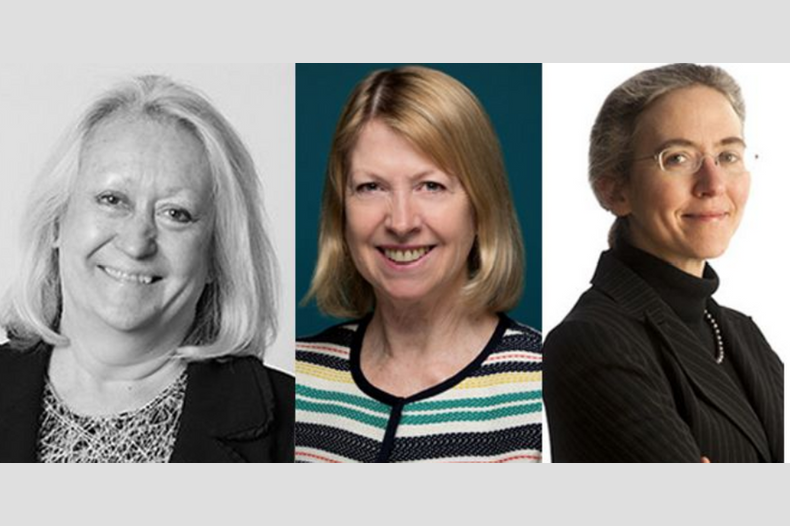Empowerment and confidence: the keys to success for women in the IP sector
CITMA past presidents agree on the requirements for supporting women in IP careers

The theme of this year’s International Women’s Day was “Break the Bias” and in our IWD webinar we heard from three women who have done just that throughout their IP careers.
CITMA past Presidents Kate O’Rourke (2016) of Mewburn Ellis, Catherine Wolfe (2012) of Boult Wade Tennant, and Maggie Ramage (2010) of Edwin Coe LLP shared their thoughts on how to support women’s careers in IP with panel Chair Rachel Wilkinson-Duffy, of Baker Mckenzie.
The trade mark sector is in a better position than many others when it comes to female representation; 60% of CITMA members are women.
However, this is not reflected at partnership level in the profession, which remains male-dominated.
This persistent imbalance is underscored by the fact that in CITMA’s 88-year history only six women have held the post of President.
During those presidencies, women have overseen some of the most important developments in the history of the organisation.
Maggie Ramage was President during the crucial period when regulation was introduced and IPReg was established to monitor the profession.
Catherine Wolfe, whose presidency followed immediately afterward, played a core role in safeguarding the institute’s financial position and boosting membership and morale.
Kate O’Rourke became President in 2016 and was deeply involved both in stewarding the Institute’s response to Brexit and also in preparing its application for Royal Chartership, which was granted that year.
Role models, inspirations, and empowerment
These three women have undoubtedly served as role models to women in IP, but who inspired and supported them and what kinds of role models do women need today?
When considering the role models in their own careers, the panel showed consensus around the characteristics they shared: they all focused on empowering and building confidence in those around them.
Maggie recalled her first boss, a charismatic patent attorney who identified her potential and pushed her to first study A Level Law and then progress through trade mark qualifications.
Maggie noted: “A lot of what women need to think about is confidence. As long as you’ve got that kind of help and assistance from your surrounding colleagues you can just go for it.”
She also noted that there can be a tendency among women to go so far in their careers, but then lose confidence, something she hopes will change in future.
Kate’s biggest inspiration in career and life is her mother.
Frustrated at the curtailment of her own education and career ambitions due to prevailing social attitudes of the time, she was determined that her daughters would understand from an early age that women can achieve anything.
Kate credits her mother’s ardent feminism and tireless support for her own success, saying: “I don’t think I could have achieved nearly as much in my life without those formative years and what she taught me.”
Nurturing female ambition
Kate feels that it is vital for senior women in the industry to create an environment of empowerment and be overt about it.
She advises leaders – male and female – to look out for female career entrants who demonstrate ambition and support them to become confident that they can achieve the goals they aspire to.
Imposter syndrome is something that many women are familiar with, and leaders can help address this and instil confidence, as Kate noted: “It’s important to support other people at all levels because they do have abilities – they just sometimes need to be told that they have them!”
Catherine advised that we need to create an environment where women have choice in all aspects, saying: “I shouldn’t have to go and work on an oil rig just to prove I can because I’m a girl. I should have that open to me, but I should be empowered to do as I choose.”
Advice for aspiring leaders
Women who aim to become leaders in the IP industry should be proactive and tap into the expertise around them, as Kate noted: “Don’t underestimate the kindness and willingness of other people to help you.
"The great thing about CITMA is it seems to attract people who are very giving and willing to give their time to volunteer in the IP profession.”
Aspirations to lead must have direction, says Catherine, advising women to: “work out what is it that isn’t happening that would want to change […] Once you’ve identified what it is you want to see, you can then work out what is required to drive that.”
Finally, Maggie encourages women in junior roles to get involved with bodies such as CITMA: “By getting involved with the institute you get a lot more clued up on what the industry is actually all about. A lot of it is about getting involved.”
Thanks to the ongoing passion and commitment of women like Catherine, Kate, and Maggie, the industry continues to make progress on creating an environment of empowerment and confidence that should see even more women advancing into senior leadership roles and breaking the bias at the highest levels of the profession.
Hear Kate, Maggie, Catherine and Rachel discuss more about empowering women in IP in our on-demand webinar.

